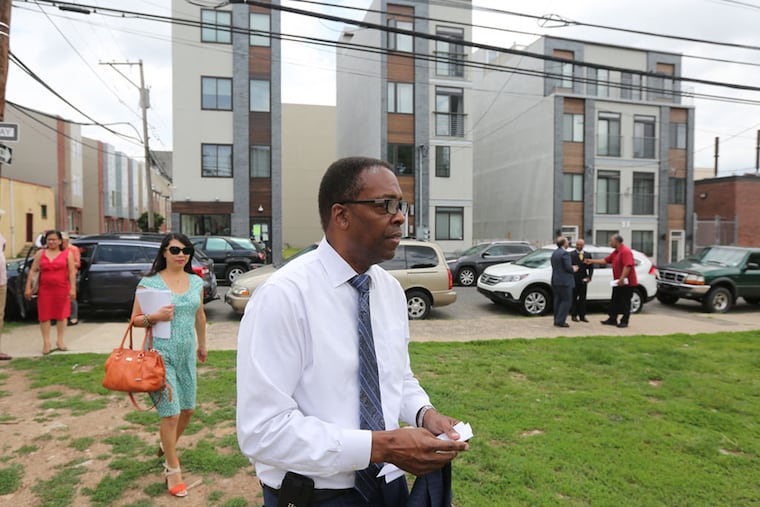In burgeoning Francisville, a plan for 'workforce housing'
From his second-floor window Monday afternoon, Vincent Ean eyed the vacant lot across North 16th Street. Men in suits circled a white tent. Ean snapped a photo with his smartphone and sent it to his fiancee.

From his second-floor window Monday afternoon, Vincent Ean eyed the vacant lot across North 16th Street. Men in suits circled a white tent. Ean snapped a photo with his smartphone and sent it to his fiancee.
Last October, they bought their condo in Francisville for $262,500. He works in marketing and telecommutes for a company in New York. Progress in Francisville, he said, is apparent on a week-to-week basis.
"It's growing," Ean said. "There are so many other neighborhoods in Philly. But this one, in a year or two, there will be a big, dramatic change."
That is why the tent filled with city and housing officials and longtime residents Monday on Ean's block. City Council President Darrell L. Clarke, standing on vacant city-owned land, was there to tout his plan for 1,000 affordable houses in rapidly appreciating neighborhoods.
Francisville is one such neighborhood. As development stretches north from Fairmount, some newly constructed homes are going for more than $300,000.
"While there's a significant amount of market-rate housing, as you see," Clarke said, gesturing toward Ean's building, "the reality is, everybody can't afford to live in those properties. We've come up with what we believe is a very creative solution."
Under Clarke's plan, the city will sell some of its vacant land to developers for $1 with the condition the houses be sold at lower than market rate. Those prices must be maintained for 10 years, regardless of resale, through deed restrictions.
Clarke called it "workforce housing," targeted for middle-class families. The city accepted proposals for 28 properties in Francisville to be sold at a maximum of $180,000 for a household of two and $259,000 for a five-person household.
These projects, Clarke said, must be completed within 24 months of settlement on the lots.
Brian Hudson Sr., executive director of the Pennsylvania Housing Finance Agency, said his organization has set aside funds to offer 30-year fixed-rate mortgages at 3 percent.
"As our neighborhoods change, too many times folks get left behind," said Brian Abernathy, executive director of the Philadelphia Redevelopment Authority. "Our communities start to all look the same. As we look at neighborhoods like Point Breeze, Francisville, and Mantua, we want to make sure that we have diverse communities."
But untangling land from city control is not straightforward. Monday's news conference announced "the arrival of the groundbreaking phase." Construction has not started in Francisville because the Water Department has not yet approved it, Clarke's office said.
And while trade unions agreed to a reduction in their prevailing wage, to help make rental housing at the site affordable, the regional U.S. Department of Housing and Urban Development office denied approval of the wage cut. Clarke said he would appeal to Washington.
Milton Sloan, a Francisville resident of 37 years, said he liked the plan as long as the mortgage rates were as advertised.
"People can come in and live together," said Sloan, 65. "Keep the drug dealers out, so people can sit on their steps and eat their dinner without hearing gunfire."
Next week, a cafe called Vineyards will open at 16th and Ogden Streets. Cans of La Colombe coffee were stocked on shelves inside. Anthony Miles, a developer with numerous projects in the area, including Vineyards and Ean's condo, praised inclusion.
"In any neighborhood," Miles said, "we should have a diverse mix of incomes."
That was something Miles pitched to Ean and his fiancee when they shopped for a home. They are excited to be a part of a growing neighborhood.
Ean looked around. On each side of his condo sits vacant city-owned land. He will measure progress not by income or race.
"I would like to have sidewalks," Ean said. "We need neighbors."